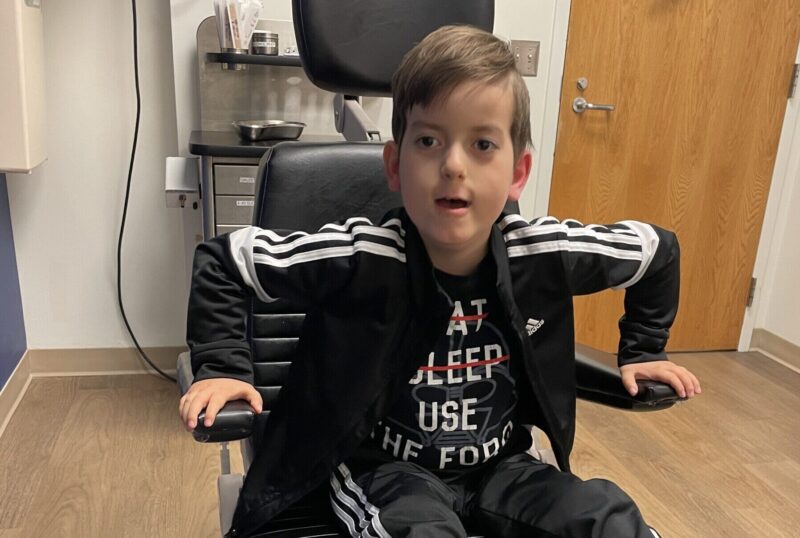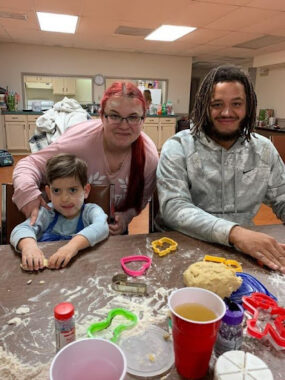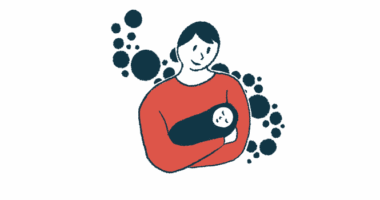
Pompe protectors: Essential tips for caregivers
Written by Keara Engle, April 22, 2024

Cayden, 6, sits in a chair at the ear, nose and throat specialist during a recent checkup for his ears. (Photos courtesy of Keara Engle)
When I learned that my child had infantile-onset Pompe disease, I honestly wasn’t sure what to expect. As a mother, especially a first-time mom, something like this felt like my worst nightmare. I quickly learned this wasn’t the end of the road. In fact, it was just the beginning.
My son, Cayden, was diagnosed via newborn screening. I wasn’t even aware this was a routine test for newborns in Pennsylvania, but I sure am grateful that it exists. Who knows how long it could have taken doctors to diagnose him with such a rare disease?
Here I was, at 16 years old, managing motherhood with a child who had a rare genetic disease. Nowadays, we have the advantage of access to the internet, as well as social media. These resources led me to my journey of finding support groups, which was the best decision I ever made.
Facebook is a great place for support groups. I’ve been able to connect with other families from all over the world. Hearing their stories and seeing children who are just like my son gave me all the reassurance I needed to know that everything was going to be OK. I quickly became close to families who have helped me cope with it all over the years.
It also helped my son when he had the chance to interact with other children who have Pompe. We’ve been able to connect with others via video chats. There also are opportunities to meet with other families during conferences, including one that occurs annually, hosted by Duke University in North Carolina. Many families have been able to connect at the conferences — and the children really enjoy it!
Advice from other Pompe parents
One piece of advice I was given by other families and I’ve found to be very accurate is that the first year is the hardest. During this time, you are trying to figure out infusions, medications, appointments, therapies, etc. It can be stressful until you develop a routine and get the hang of everything. Once that happens, everything becomes second nature.
I remember how nervous I was for my son to start his enzyme replacement infusions. Although I had faith in his doctors, it didn’t make it any less scary. Looking back, I now realize I had nothing to worry about. These infusions have become a way of life for Cayden. He likes to call them his “muscle juice,” which I absolutely adore.

Cayden Camacho, 5, bakes cookies at a family gathering with his mother, Keara Engle, and her boyfriend, Frankie Clark.
As he’s gotten older and started to talk, he does have questions. It can be challenging to figure out how to answer some of these in a way that a 6-year-old can understand. However, I try to be open and honest. I don’t want to hide things from him; after all, it is his body and he has the right to know everything about it.
When he has checkups with his specialists, he is often curious about what is going to occur at the appointments. I always tell him exactly what will happen, so that there are no sudden surprises. I’ve learned that withholding details only stresses him more.
For instance, when Cayden has to get blood taken for the routine lab work for his Pompe, it can be nerve-wracking for him. Almost no one likes to get blood taken, especially a young child, but I let him know that it’s going to happen ahead of time. I’ll usually tell him in the morning prior to leaving the house. This way, we have time to emotionally prepare him for the day ahead instead of him suddenly finding out he will need to get blood taken when we get there.
An emotional journey for Pompe caregivers
Speaking of emotions, I have learned to allow myself to feel them! It’s never good to bottle up your emotions and not acknowledge them. When times are tough and emotions are high, reach out to your circle, whether that be family, friends, or even other Pompe parents.
Therapy and medication have also helped me cope with my emotions. I found a therapist whom I really like and can confide in. The journey we experience raising a child with a rare disease is not one too many people can relate to. It helps to have an outlet and someone who can help you make sense of and understand some of your thoughts and feelings.
I’ve also found it helpful to lighten the load on myself by preparing ahead when I know Cayden has a long day of appointments coming up. The night before, I will prep lunch, make sure the car’s gas tank is filled up, and pack a bag with Cayden’s essentials. It makes it easier because when the morning comes around, I can just grab our bags and go.
And one thing I’ve learned never to do is compare my child to other children with Pompe. Each person is going to have their own experience with this disease. No two children will present with the same exact symptoms on the same exact timeline. Because Pompe is genetic, many different genetic mutations can lead to it. Some are more severe, and some are less severe. That’s what makes each person’s experience so unique.
If I could go back in time, I wouldn’t change a thing. Pompe is not a death sentence, and I’ve learned to be thankful for the way life turned out for myself and my son. Cayden finds joy in life just by being him. Although he can’t walk, he doesn’t let that stop him from anything. He enjoys activities just like other kids, such as coloring, blowing bubbles, playing catch, and playing with toys including action figures and cars.
I can truly say that I wouldn’t be the woman that I am today without this experience. Becoming a rare disease parent was not something I ever thought would happen to me. There is no manual on how to navigate this journey, but my child has shown me that I don’t need one.
Note: Pompe Disease News is strictly a news and information website about the disease. It does not provide medical advice, diagnosis, or treatment. This content is not intended to be a substitute for professional medical advice, diagnosis, or treatment. Always seek the advice of your physician or other qualified health provider with any questions you may have regarding a medical condition. Never disregard professional medical advice or delay in seeking it because of something you have read on this website. The opinions expressed in this column are not those of Pompe Disease News or its parent company, Bionews, and are intended to spark discussion about issues pertaining to Pompe disease.
About the author

Keara Engle is located in south-central Pennsylvania and has lived there her whole life. Keara is a single mother and has two little boys, Cayden and Kyree. Her oldest, Cayden, was born in February 2018 and was diagnosed with infantile-onset Pompe disease shortly after. He was the first baby in Pennsylvania diagnosed via newborn screening. She hopes that her column, “Powering Through Pompe,” will bring comfort to those that are also dealing with Pompe disease. She remembers how scary it was when her son was first diagnosed and wants to help guide others through their journey.
Related articles



